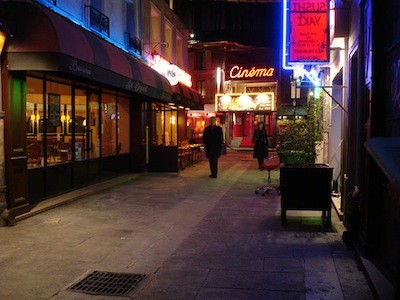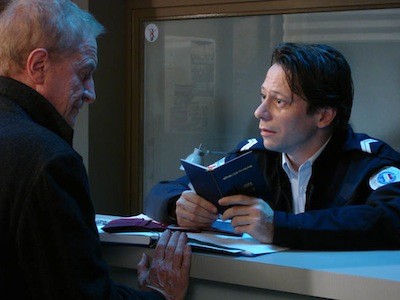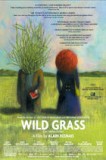| Reviews & Columns |
|
Reviews DVD TV on DVD Blu-ray 4K UHD International DVDs In Theaters Reviews by Studio Video Games Features Collector Series DVDs Easter Egg Database Interviews DVD Talk Radio Feature Articles Columns Anime Talk DVD Savant Horror DVDs The M.O.D. Squad Art House HD Talk Silent DVD
|
DVD Talk Forum |
|
|
| Resources |
|
DVD Price Search Customer Service #'s RCE Info Links |
|
Columns
|
|
|
Wild Grass

Sometimes there are scenes in a movie that come along to illustrate how you feel watching the film. Whether it's intentional or not, they pop up and act as moments of catharsis, and regardless of whatever else you are thinking about the movie, you get the satisfaction that comes with knowing someone else understands what it's like to be stuck watching what you're watching.
In legendary director Alain Resnais' latest, Wild Grass, the scene arrives more than halfway in when Marguerite (Sabine Azéma), the dentist with the ridiculous hair whom we are expected to believe is so alluring that every breathing male immediately falls in love with her, has lost her touch and is unable to properly numb her patients. Resnais shows this in a montage of raised hands, as young and old cry out, "You're hurting me!" In one quick blast, I felt released. In my head, I raised my hand and shouted, "You're hurting me, too!"
Wild Grass is a film about two people inextricably connected to one another by fate. When Marguerite has her purse stolen, her wallet ends up in a parking lot across town, where Georges (André Dussollier) finds it. He becomes obsessed with the woman he discovers inside the pocketbook. Her I.D. depicts Marguerite as a sourpuss, while her pilot's license shows her as a fun-loving adventurer. He imagines himself calling her and flirting with her. He also fears for his own credibility, alluding to some possible sexual violence in his past. Georges tries to call her and chickens out, but his wife (Anne Consigny) encourages him to see it through. He takes a chance and takes the wallet to the police station. There, he has a brief conversation with Officer Bernard (Mathieu Amalric), who Georges fears recognizes him for his previous misdeeds, but who is really just crushing on Marguerite.
Long story short, Marguerite gets her wallet back, but when her thank-you phone call doesn't yield the desired results, Georges loses his temper, then feels contrite, and then stalks Marguerite while riding a rollercoaster of more anger and contriteness that is, frankly, off-putting, childish, and creepy. It culminates in him slashing the tires on her car, prompting her to report his behavior to Bernard. But then Marguerite starts to feel bad that she might have gotten him in trouble, tracks him down at a screening of The Bridges at Toko-Ri, and when Georges rebuffs her, the tables turn and Marguerite becomes obsessed with him. She wants to prove to him that she is the happy pilot, not the sallow dentist. Frankly, they are both nuts and even more nuts are Georges' wife and Maguerite's girlfriend (Emmanuelle Devos), both of whom put up and go along with this cockamamie affair.

Resnais presents Wild Grass as a playful, freewheeling romp through mid-life crises. It's a strange and unpredictable world, and anything can happen. Working from a novel by Christian Gailly, the director and screenwriters Alex Reval and Laurent Herbiet also load up this flight of fancy with heavy metaphors and literary pretensions. The narration shifts points of view, taking us in and out of Georges and Marguerite's heads and filling in the gaps with a third-person omniscient narrator (Edouard Baer) that has a lot to say at the start but who then starts coming in and out as he sees fit. Maybe he lost interest and went out to the lobby to check his e-mail. Who can say?
The thing is, this wonderful fable-like spell that Resnais intends to weave didn't charm me at all. As a fan of his earlier work, films like Hiroshima Mon Amour and Last Year at Marienbad, the advance good word on Wild Grass made me hopeful that it would repair the damaged relationship the director and I have. Last year I reviewed a quartet of films Resnais made in the 1980s, and with each one, I got more and more disheartened. The one-time inventive filmmaker had grown increasingly self-reflexive and formalist, and the work stuck me as overly intellectual and underdeveloped on all other fields. While Wild Grass is certainly more loosey goosey than, say, Love Unto Death, the newfound whimsy does not make for a superior trade-in for mastery and control. The narrative of Wild Grass doesn't flow; the film isn't electrified with the sensation that anything can happen, it just feels like Resnais made it up as he went. Story points don't connect, others fade--what happened to Georges' primal instincts? where did Bernard go?--and as characters surrender to random action, their author does the same via momentary aesthetic shifts. Yes, I know, it's not about "plot," but still, it's got to be about something. You can't fool me with your audacious artistry. Honestly, a lot of the time, Wild Grass felt like a parody of foreign films made by someone who doesn't really watch foreign films. Stop, you're hurting me!
The cop-out ending that isn't really an ending confirmed my worst suspicions. Georges has been reduced to slapstick, Marguerite is possessed of a cartoon lust, and if no one has any idea where it will end up and none of it is meant to really go anywhere anyway, then really, any stopping point is as good as another. Resnais has the characters disappear behind some trees, and then...well, the very last scene is something I have no explanation for. Is it a sudden grab for David Lynchian weirdness? Or is it simply a Ralph Wiggum-esque non-sequiter? ("My cat's breath smells like cat food.") If you can make it all the way to the end of Wild Grass, you tell me. I'm all ears.
Jamie S. Rich is a novelist and comic book writer. He is best known for his collaborations with Joelle Jones, including the hardboiled crime comic book You Have Killed Me, the challenging romance 12 Reasons Why I Love Her, and the 2007 prose novel Have You Seen the Horizon Lately?, for which Jones did the cover. All three were published by Oni Press. His most recent projects include the futuristic romance A Boy and a Girl with Natalie Nourigat; Archer Coe and the Thousand Natural Shocks, a loopy crime tale drawn by Dan Christensen; and the horror miniseries Madame Frankenstein, a collaboration with Megan Levens. Follow Rich's blog at Confessions123.com.
|
| Popular Reviews |
| Sponsored Links |
|
|
| Sponsored Links |
|
|
| Release List | Reviews | Shop | Newsletter | Forum | DVD Giveaways | Blu-Ray | Advertise |
|
Copyright 2024 DVDTalk.com All Rights Reserved. Legal Info, Privacy Policy, Terms of Use,
Manage Preferences,
Your Privacy Choices | |||||||











